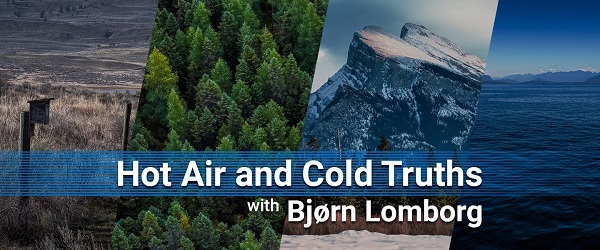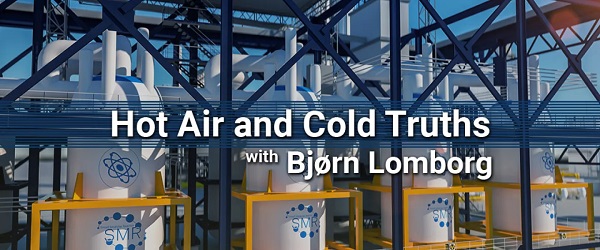Bjorn Lomborg
We need to get smart about climate

From the Fraser Institute
APPEARED IN THE FINANCIAL POST
By: Bjørn Lomborg
Canada’s chattering classes claim that climate change is one of the country’s pre-eminent threats. This is extraordinary. Canada is experiencing a productivity slowdown, the worst decline in living standards in 40 years, and growth rates that lag most developed economies. Geopolitical threats loom, the healthcare system is under stress and education is faltering. Yet the federal government has spent or committed more than $160 billion on climate initiatives since 2015, and is funneling $5.3 billion to help poor countries respond to climate change.
Like most nations, Canada faces tough decisions in coming decades. Resources spent on climate will not be not available for health, education, security or boosting prosperity.
Global warming is a real problem. Science has shown quite clearly that more CO₂, mostly from fossil fuel use, increases global temperatures. Climate economics has shown how this brings both problems and benefits (for instance, more deaths caused by heat, fewer by cold) but, overall, more problems than benefits. More CO₂ means higher social costs, so reducing CO₂ does have real benefits.
But climate policies also have costs. They force families and businesses to use more expensive energy, which slows economic growth. You might have heard otherwise but if the new ways really were cheaper, no regulations or mandates would be needed.
If climate change were treated like any other political issue, we would openly recognize these trade-offs and try to balance them to get the most climate benefits for the least cost, recognizing that climate policies need to compete against many other worthy policies.
But in two important ways the climate conversation has gone off the rails.
First, people say — wrongly — that global warming is an existential challenge, risking the end of mankind. Of course, if the world is about to end, it follows that any spending is justified. After all, if a world-obliterating meteor is hurtling towards us, we don’t ask about the costs of avoiding it.
Second, it is also often claimed — somewhat contradictorily — that the green transition will make energy cheaper, societies safer and everyone richer. In this “rainbows and unicorns” scenario, there are no trade-offs and we can afford climate policy and everything else.
Both claims are repeated ad nauseam by Canadian politicians and activists and spread by media hooked on selling climate catastrophes and green utopias. But both are quite untrue.
That is why I’m writing this series. I will outline how many of the most sensationalist, scary climate stories are misleading or wrong and ignore the best climate science. Being data-driven, I will show you this with the best peer-reviewed data and numbers.

So: Is climate change the world’s all-encompassing problem today? One way to test this is to look at extreme weather, which we constantly hear is having an ever-larger impact on our societies. But the data paint a very different picture (see chart).
We have good evidence for the number of people killed in climate-related disasters, i.e., floods, storms, droughts, and fires. (We’ll look at temperature deaths next week.) A century ago, such disasters routinely killed hundreds of thousands, even millions of people in a single disaster. On average, about half a million people a year died in such disasters. Since then, the death toll has declined precipitously. The last decade saw an average of fewer than 10,000 deaths per year, a decline of more than 97 per cent.
Of course, over the past century the world’s population has quadrupled, which means the risk per person has dropped even more, and is now down by more than 99 per cent. Why this great success story? Because richer, more resilient societies with better technology and forecasting are much better able to protect their citizens. That doesn’t mean there is no climate signal at all, but rather that technology and adaptation entirely swamp its impact.
In the same way, climate’s impact on overall human welfare is also quite small. In proportion to the total economy, the cost of climate-related disasters has been declining since 1990. Looking to the future, the best estimates of the total economic impact of climate change come from two major meta-studies by two of the most respected climate economists. Each shows that end-of-century GDP, instead of being 350 per cent higher, will only be 335 per cent higher.
“Only” becoming 335 per cent richer is a problem, to be sure, but not an existential threat. Despite that, as this series will show, many of the most draconian climate policy proposals so casually tossed around these days will do little to fix climate but could dramatically lower future growth and the opportunities of future generations.
We need to get smart on climate. This series will map out how.
Bjorn Lomborg
The Physics Behind The Spanish Blackout

From the Frontier Centre for Public Policy
Madrid knew solar and wind power were unreliable but pressed ahead anyway
When a grid failure plunged 55 million people in Spain and Portugal into darkness at the end of April, it should have been a wake-up call on green energy. Climate activists promised that solar and wind power were the future of cheap, dependable electricity. The massive half-day blackout shows otherwise. The nature of solar and wind generation makes grids that rely on them more prone to collapse—an issue that’s particularly expensive to ameliorate.
As I wrote in these pages in January, the data have long shown that environmentalists’ vision of cheap, reliable solar and wind energy was a mirage. The International Energy Agency’s latest cost data continue to underscore this: Consumers and businesses in countries with almost no solar and wind on average paid 11 U.S. cents for a kilowatt hour of electricity in 2023, but costs rise by more than 4 cents for every 10% increase in the portion of a nation’s power generation that’s covered by solar and wind. Green countries such as Germany pay 34 cents, more than 2.5 times the average U.S. rate and nearly four times China’s.
Prices are high in no small part because solar and wind require a duplicate backup energy system, often fossil-fuel driven, for when the sun doesn’t shine or the wind doesn’t blow. The Iberian blackout shows that the reliability issues and costs of solar and wind are worse than even this sort of data indicates.
Grids need to stay on a very stable frequency—generally 50 Hertz in Europe—or else you get blackouts. Fossil-fuel, hydro and nuclear generation all solve this problem naturally because they generate energy by powering massive spinning turbines. The inertia of these heavy rotating masses resists changes in speed and hence frequency, so that when sudden demand swings would otherwise drop or hike grid frequency, the turbines work as immense buffers. But wind and solar don’t power such heavy turbines to generate energy. It’s possible to make up for this with cutting-edge technology such as advanced inverters or synthetic inertia. But many solar and wind farms haven’t undergone these expensive upgrades. If a grid dominated by those two power sources gets off frequency, a blackout is more likely than in a system that relies on other energy sources.
Spain has been forcing its grid to rely more on unstable renewables. The country has pursued an aggressive green policy, including a commitment it adopted in 2021 to achieve “net zero” emissions by 2050. The share of solar and wind as a source of Spain’s electricity production went from less than 23% in 2015 to more than 43% last year. The government wants its total share of renewables to hit 81% in the next five years—even as it’s phasing out nuclear generation.
Just a week prior to the blackout, Spain bragged that for the first time, renewables delivered 100% of its electricity, though only for a period of minutes around 11:15 a.m. When it collapsed, the Iberian grid was powered by 74% renewable energy, with 55% coming from solar. It went down under the bright noon sun. When the Iberian grid frequency started faltering on April 28, the grid’s high proportion of solar and wind generation couldn’t stabilize it. This isn’t speculation; it’s physics. As the electricity supply across Spain collapsed, Portugal was pulled along, because the two countries are tightly interconnected through the Iberian electricity network.
Madrid had been warned. The parent company of Spain’s grid operator admitted in February: “The high penetration of renewable generation without the necessary technical capabilities in place to keep them operating properly in the event of a disturbance . . . can cause power generation outages, which could be severe.”
Yet the Spanish government is still in denial. Even while admitting that he didn’t know the April blackout’s cause, Prime Minister Pedro Sánchez insisted that there was “no empirical evidence” that renewables were to blame and that Spain is “not going to deviate a single millimeter” from its green energy ambitions.
Unless the country—and its neighbors—are comfortable with an increased risk of blackouts, this will require expensive upgrades. A new Reuters report written with an eye to the Iberian blackout finds that for Europe as a whole this would cost trillions of dollars in infrastructure updates. It’s possible that European politicians can talk voters into eating that cost. It’ll be impossible for India or nations in Africa to follow suit.
That may be unwelcome news to Mr. Sánchez, but even a prime minister can’t overcome physics. Spain’s commitment to solar and wind is forcing the country onto an unreliable, costly, more black-out-prone system. A common-sense approach would hold off on a sprint for carbon reductions and instead put money toward research into actually reliable, affordable green energy.
Unfortunately for Spain and those countries unlucky enough to be nearby, the Spanish energy system—as one Spanish politician put it—“is being managed with an enormous ideological bias.”
Bjorn Lomborg is president of the Copenhagen Consensus, a visiting fellow at Stanford University’s Hoover Institution and author of “Best Things First.”
Bjorn Lomborg
How Canada Can Respond to Climate Change Smartly

From the Fraser Institute
At a time when public finances are strained, and Canada and the world are facing many problems and threats, we need to consider policy choices carefully. On climate, we should spend smartly to solve it effectively, making sure there is enough money left over for all the other challenges.
A sensible response to climate change starts with telling it as it is. We are bombarded with doom-mongering that is too often just plain wrong. Climate change is a problem but it’s not the end of the world.
Yet the overheated rhetoric has convinced governments to spend taxpayer funds heavily on subsidizing current, inefficient solutions. In 2024, the world spent a record-setting CAD$3 trillion on the green energy transition. Taxpayers are directly and indirectly subsidizing millions of wind turbines and solar panels that do little for climate change but line the coffers of green energy companies.
We need to do better and invest more in the only realistic solution to climate change: low-carbon energy research and development. Studies indicate that every dollar invested in green R&D can prevent $11 in long-term climate damages, making it the most effective long-term global climate policy.
Throughout history, humanity has tackled major challenges not by imposing restrictions but by innovating and developing transformative technologies. We didn’t address 1950s air pollution in Los Angeles by banning cars but by creating the catalytic converter. We didn’t combat hunger by urging people to eat less, but through the 1960s Green Revolution that innovated high-yielding varieties to grow much more food.
In 1980, after the oil price shocks, the rich world spent more than 8 cents of every $100 of GDP on green R&D to find energy alternatives. As fossil fuels became cheap again, investment dropped. When climate concern grew, we forgot innovation and instead the focus shifted to subsidizing existing, ineffective solar and wind.
In 2015, governments promised to double green R&D spending by 2020, but did no such thing. By 2023, the rich world still wasn’t back to spending even 4 cents out of every $100 of GDP.
Globally, the rich world spends just CAD$35 billion on green R&D — one-hundredth of overall “green” spending. We should increase this four-fold to about $140 billion a year. Canada’s share would be less than $5 billion a year, less than a tenth of its 2024 CAD$50 billion energy transition spending.
This would allow us to accelerate green innovation and bring forward the day green becomes cheaper than fossil fuels. Breakthroughs are needed in many areas. Take nuclear power. Right now, it is way too expensive, largely because extensive regulations force the production of every new power plant into what essentially becomes a unique, eye-wateringly expensive, extravagant artwork.
The next generation of nuclear power would work on small, modular reactors that get type approval in the production stage and then get produced by the thousand at low cost. The merits of this approach are obvious: we don’t have a bureaucracy that, at a huge cost, certifies every consumer’s cellphone when it is bought. We don’t see every airport making ridiculously burdensome requirements for every newly built airplane. Instead, they both get type-approved and then mass-produced.
We should support the innovation of so-called fourth-generation nuclear power, because if Canadian innovation can make nuclear energy cheaper than fossil fuels, everyone in the world will be able to make the switch—not just rich, well-meaning Canadians, but China, India, and countries across Africa.
Of course, we don’t know if fourth-generation nuclear will work out. That is the nature of innovation. But with smarter spending on R&D, we can afford to focus on many potential technologies. We should consider investing in innovation to grow hydrogen production along with water purification, next-generation battery technology, growing algae on the ocean surface producing CO₂-free oil (a proposal from the decoder of the human genome, Craig Venter), CO₂ extraction, fusion, second-generation biofuels, and thousands of other potential areas.
We must stop believing that spending ever-more money subsidizing still-inefficient technology is going to be a major part of the climate solution. Telling voters across the world for many decades to be poorer, colder, less comfortable, with less meat, fewer cars and no plane travel will never work, and will certainly not be copied by China, India and Africa. What will work is innovating a future where green is cheaper.
Innovation needs to be the cornerstone of our climate policy. Secondly, we need to invest in adaptation. Adaptive infrastructure like green areas and water features help cool cities during heatwaves. Farmers already adapt their practices to suit changing climates. As temperatures rise, farmers plant earlier, with better-adapted varieties or change what they grow, allowing the world to be ever-better fed.
Adaptation has often been overlooked in climate change policy, or derided as a distraction from reducing emissions. The truth is it’s a crucial part of avoiding large parts of the climate problem.
Along with innovation and adaptation, the third climate policy is to drive human development. Lifting communities out of poverty and making them flourish is not just good in and of itself — it is also a defense against rising temperatures. Eliminating poverty reduces vulnerability to climate events like heat waves or hurricanes. Prosperous societies afford more healthcare, social protection, and investment in climate adaptation. Wealthy countries spend more on environmental preservation, reducing deforestation, and promoting conservation efforts.
Focusing funds on these three policy areas will mean Canada can help spark the breakthroughs that are needed to lower energy costs while reducing emissions and making future generations around the world more resilient to climate and all the other big challenges. The path to solving climate change lies in innovation, adaptation, and building prosperous economies.
-

 Daily Caller2 days ago
Daily Caller2 days agoLaura Ingraham’s Viral Clash With Trump Prompts Her To Tell Real Reasons China Sends Students To US
-

 Frontier Centre for Public Policy2 days ago
Frontier Centre for Public Policy2 days agoRichmond Mayor Warns Property Owners That The Cowichan Case Puts Their Titles At Risk
-

 Business2 days ago
Business2 days agoSluggish homebuilding will have far-reaching effects on Canada’s economy
-

 Business2 days ago
Business2 days agoMark Carney Seeks to Replace Fiscal Watchdog with Loyal Lapdog
-

 Business6 hours ago
Business6 hours agoParliamentary Budget Officer begs Carney to cut back on spending
-

 Censorship Industrial Complex22 hours ago
Censorship Industrial Complex22 hours agoEU’s “Democracy Shield” Centralizes Control Over Online Speech
-

 International23 hours ago
International23 hours agoBondi and Patel deliver explosive “Clinton Corruption Files” to Congress
-

 International22 hours ago
International22 hours agoState Department designates European Antifa groups foreign terror organizations










